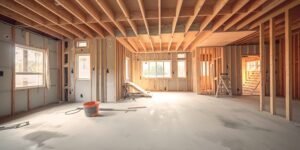Builders are no strangers to 2-10 home warranties—and with good reason. This critical coverage is the only way to protect builders from the long-term risk of major structural claims.
However, where to buy them, what coverage to look for, and how to select the right warranty administrator still carries some mystery. As one of the industry’s most reputable 2-10 warranty providers, PWSC is here to offer clarity by answering some of the most commonly asked builder questions.
What is a 2-10 warranty?
A 2-10 warranty is an insured protection plan given to home buyers by builders providing coverage for the materials, systems, and structural elements of a newly constructed home.
The insurance-backed warranty provides new buyers assurance that should something go wrong with the home covered by the agreement, the builder and/or warranty provider will fix the problem in compliance with industry-accepted construction standards.
Without a 2-10 warranty, builders are still on the hook for certain fit and finish, systems, and structural warranties in accordance with the statutes of their state. A 2-10 warranty also helps to protect the builder from lengthy exposure to costly structural claims.
What does a 2-10 warranty cover?
A 2-10 warranty covers three aspects of a newly constructed home:
- Materials and workmanship – Establishes standards regarding the fit, finish, and materials used in the construction of the home. Fit addresses how well parts of the finished product come together. Finish deals with the work’s completeness.
- Systems – Establishes standards regarding “inside the wall” systems such as plumbing, electrical, and mechanical vital to a home’s operation.
- Structural – Covers defined defects to the home’s designated load-bearing elements.
How long does a 2-10 warranty provide coverage?
“2-10” refers to the years of coverage associated with the warranty. However, a better name might be a “1-2-10 warranty,” as that addresses all three periods of coverage.
- One year – materials and workmanship
- Two years – home systems
- 10 years – defined structural elements
The warranty’s coverage period begins at closing.
What is the difference between a 2-10 warranty and homeowners insurance?
A 2-10 warranty and homeowners insurance serve unique purposes and cover different aspects of the home.
- 2-10 warranty – While the terms may differ slightly between warranty providers, the protection typically covers the repair or replacement of major systems and structural defects due to breakdowns and defects (not associated with external factors such as vandalism or storms). A 2-10 warranty commonly covers items like HVAC systems, drywall, roofs, and structural elements. Builders must provide homeowners with warranties on these items, whether they are insured by a 2-10 warranty or not.
- Homeowners insurance – Provides financial protection against damage to a home’s structure and/or contents caused by covered perils like fire, theft, water, and weather. The coverage also offers liability protection against accidents on the property and damages to third parties. Homeowners purchase insurance directly.
How does a 2-10 warranty benefit builders?
A 2-10 warranty offers builders three key benefits:
- Financial – An insurance-backed 2-10 warranty provides builders with financial protection against damages and defects to newly constructed homes. Research presented to the National Association of Home Builders shows 25% of new homes experience a structural defect at an average cost of nearly $50,000 each. A 2-10 warranty offers financial compensation to make the necessary repairs preventing a builder from footing the bill.
- Legal – $1-million-plus verdicts related to habitability claims are on the rise. Keeping homeowner disputes out of the courtroom is key to maintaining financial stability for builders. A good 2-10 warranty should come with a set of construction standards aligned with state regulations used to evaluate and fulfill repair requests. The warranty provider also should have a well-defined claims resolution process that settles issues through mediation and arbitration rather than judges and juries.
- Customer service and satisfaction – Research published by the National Association of Realtors shows nine in 10 newly built homes experience premature maintenance issues. When buyers are likely making the biggest purchase of their lives, the extra reassurance of a third-party insured warranty may be critical. Additionally, 2-10 warranty providers like PWSC offer premier customer service with round-the-clock submission access.
Are 2-10 warranties required for HUD homes?
The Department of Housing and Urban Development changed the rules for FHA, VA, and USDA home loans in 2021. While a 10-year insured warranty was a previous requirement for securing these types of loans, HUD lifted that requirement and made it optional for meeting mortgage warranty obligations. However, mortgage companies may still require a 2-10 warranty under their own loan conditions.
Contact our team of experts at sales@pwsc.com to learn more about HUD’s revised warranty compliance. We’ll be happy to provide the details!
2-10 Warranty Protection with PWSC
While 2-10 warranties may be somewhat standard, the companies providing them are not. Who you partner with for coverage, warranty administration, and customer service makes all the difference.
PWSC safeguards many of the nation’s largest builders and more than 1.7 million homes with best-in-class warranty coverage. Our team of experts work with builders to meet homeowner expectations, protect properties, and boost their business reputation—all without breaking the bank. PWSC’s 2-10 warranty offers 10 years of financial security and coverage against workmanship problems, system failures, and structural defects with A-rated insurance coverage. When things go wrong, PWSC makes it right for both builders and buyers alike.




